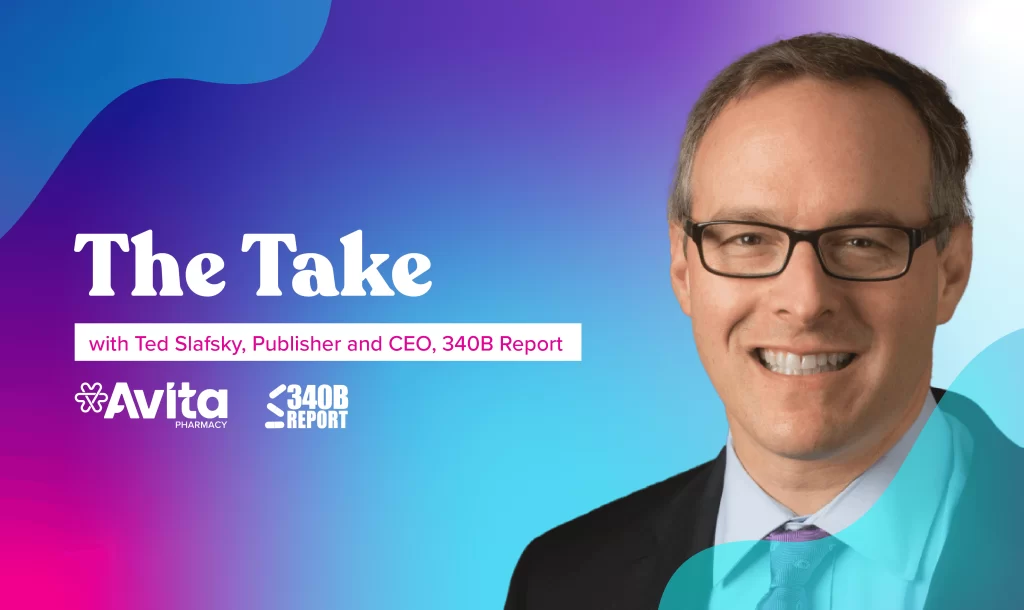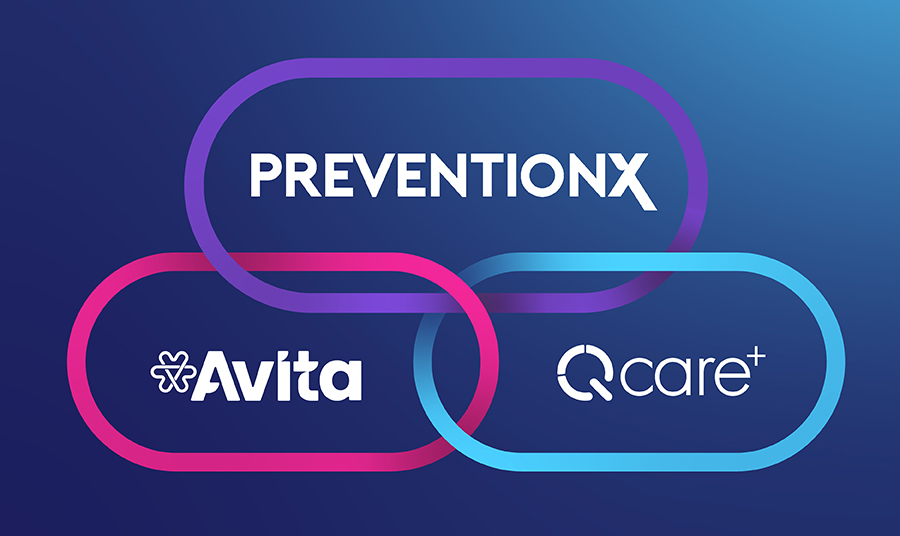Originally established in 1992 to help safety-net health care providers stretch dwindling federal resources and offer better care for some of America’s most vulnerable communities, the 340B Drug Pricing Program recently has been a hot topic of conversation on both a local and national level. Referred to as “a lifeline to the neediest and most underserved patients in this nation,” the program can be tough for even the savviest covered entities to figure out without the help of a 340B expert. Recent rounds of manufacturer restrictions on the delivery of discounted drugs have added to the confusion and resulted in stakeholders seeking strategic guidance on how to future-proof the sustainability of their missions in a changing environment.
In our inaugural edition of the The Take, Avita’s new blog series featuring insights from industry thought leaders, we spoke to Ted Slafsky, who has been helping folks navigate the world of 340B for more than 25 years. Now the Publisher and CEO of 340B Report, he formerly headed up 340B Health and co-founded the 340B Coalition.
Read on for Slafsky’s views on the recent legal and policy nuances surrounding 340B, his thoughts on why Congress needs to get involved, and why he predicts that the program has a solid future in the long run.
Avita: You’ve been covering the 340B program for a long time. What’s your assessment of the current environment?
Ted Slafsky, 340B Report: I’ve never seen such a tumultuous time with 340B in my 25-plus years’ experience with the program. It’s unprecedented, and something that I think needs to be resolved expeditiously. That’s why—and I’ve encouraged this in my columns and public speaking events—Congress should intervene.
I think [drug manufacturers] value, appreciate, and support pharmacists and pharmacy providers. But the bottom line is the financial impact.
-Ted Slafsky, Publisher and CEO, 340B Report
Avita: Especially for those of us who didn’t go to law school, the legal maneuvers between the drug manufacturers and Health Resources & Services Administration (HRSA) are pretty tough to track. How long do you think it will take for them to play out, so we can gain some clarity?
Slafsky: We’re going to see at least another year of back-and-forth on the legal end, and that would be on the short side. There are several different court cases that are pending right now, in three different jurisdictions. They will all proceed at their own pace. And as you may know, [as of right now] opening arguments haven’t even occurred in any of them. So, I don’t expect anything to be resolved within a year.
You’re going to have some more court decisions, and they could be contradictory in their findings. That’s why I’m surprised that trade groups have not more aggressively sought to get this taken care of quickly.
[THE HUMAN FACE OF 340B: Amidst all the controversy, the real reason the 340B program was created sometimes gets forgotten. Click here for insights from a patient and community advocacy leader.]
Avita: At this point, no court has enforced drug manufacturers’ compliance with HRSA’s rules, correct?
Slafsky: Correct. None of the courts have agreed with HRSA that its enforcement letters are valid and can be enforced. They’ve all been vacated. Some of the judges may have said they think HRSA has it more right than [the drug manufacturers], but none of them have said that HRSA has done everything right and can go ahead and enforce its policies.
Avita: And it seems like that has led to more manufacturers following suit with restrictions. How are covered entities dealing with this?
Slafsky: That’s right. [Currently the manufacturers] basically have a license to proceed with making similar restrictions. Now, there are some positives, or at least some things have occurred that have lessened the blow. A number of the grantees have been exempted from some of the manufacturers’ policies. Other manufacturers are allowing covered entities to submit their claims data to a third-party vendor. That’s not a perfect solution, but at least there is an avenue for the drug discounts to be restored.
Nonetheless, I think that the current system—where pharmaceutical manufacturers can dictate the terms of how the contract pharmacy program will work—is not a good system. It’s one that is really fracturing the program.
I feel confident about the future of the 340B program. I think there may be some brakes put on the program, but I don't see a complete undermining of it.
-Ted Slafsky, Publisher and CEO, 340B Report
Avita: At this point, there’s obviously friction between the multiple parties involved. What’s it going to take to bring these stakeholders—namely drug manufacturers, HRSA, and of course 340B advocacy groups—together and get them on the same page?
Slafsky: I think that there will be additional efforts made by HRSA and other parts of Health & Human Services (HHS) to try to enforce the program. I think that that will antagonize some of the judges. Eventually it’s going to need to be resolved by Congress.
Avita: Do you think drug manufacturers understand the value of pharmacy services or the roles that pharmacists and contract pharmacies play in getting claims adjudicated, educating patients, and helping with patients’ adherence and retention?
Slafsky: I think they value, appreciate, and support pharmacists and pharmacy providers. But the bottom line is the financial impact. They feel like covered entities and HRSA have not been interpreting the law correctly and decided to take a risk [by enforcing their own policies]. And so far, that risk has worked out for them.
[EXCLUSIVE 340B TIPS: Considering how to successfully navigate the 340B program during challenging times? Learn more here.]
Avita: I have a couple of crystal ball questions for you. The first is, what do you think is the next big headline? What’s the word on the street about what’s coming down the pipeline?
Slafsky: I expect more drug companies to join the 16 [currently restricting discounted drug reimbursements]. I also expect more enforcement efforts by the government, including the potential of civil monetary penalties that would be imposed on the drug manufacturers—and more legal challenges to those civil monetary penalties.
Avita: Where do you see the 340B program in three to five years?
Slafsky: I feel confident about the future of the 340B program. I think there may be some brakes put on the program, but I don’t see a complete undermining of it. In the long run, I believe the contract pharmacy program will continue to exist without manufacturers’ being successful in completely blocking the program or being able to make other significant changes to the program. The 340B program will be available for covered entities to fully take advantage of. But it‘s going to take a while for the issues before the courts to play out.
Avita: Thanks so much for your take, Ted. As an unrivaled partner in 340B administration, the Avita team knows our covered entity partners are craving actionable insights to successfully steer them through a continually changing environment. Stay tuned for the next edition of The Take, and don’t miss our latest pieces covering the 340B Program in The Avita Blog!
Avita is proud to be a sponsor of 340B Report, the only news service covering developments in the 340B program. We’re happy to offer a 25% discount for readers of this blog. The discount is only available for new subscribers. To take advantage of this opportunity, go the subscription page and use the coupon code: AVITA25.




